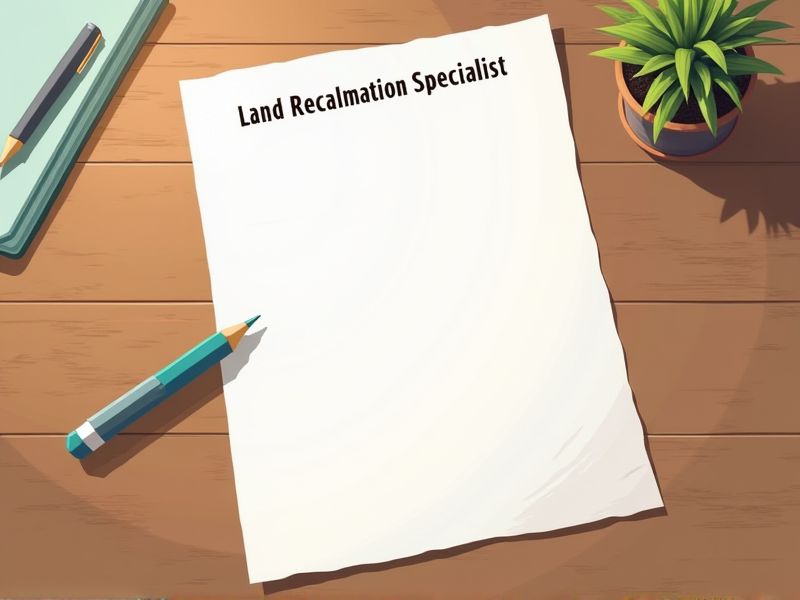
Land reclamation specialists play a critical role in transforming degraded or disturbed land into usable and productive areas, necessitating thorough knowledge and skill. Certain certifications ensure that these professionals are equipped with the expertise required for sustainable land recovery, adhering to legal and environmental guidelines. Mastery in key assessments and innovative techniques is often validated through specific certifications, which enhance credibility and employment opportunities in the field. Here are important certifications needed for a land reclamation specialist.
Certified Environmental Professional (CEP)
Increased complexity in environmental regulations demands the expertise of a Certified Environmental Professional (CEP) for land reclamation projects. The CEP provides assurance that restoration efforts will comply with legal standards and promote sustainable land use practices. Data-driven assessments conducted by a CEP help in mitigating the potential negative impacts of reclamation activities. Having a CEP on board enhances stakeholder trust and project credibility, impacting project success positively.
OSHA HAZWOPER Certification
Land reclamation specialists often work in environments with hazardous materials, making OSHA HAZWOPER certification critical to ensure they can safely handle such substances. The certification provides essential training on both managing and mitigating risks associated with hazardous waste operations. Employers require this certification to comply with federal regulations and to minimize workplace accidents and liabilities. Workers with this certification are better equipped to protect themselves and the environment during reclamation projects.
Certified Professional in Erosion and Sediment Control (CPESC)
Land reclamation projects often disturb soil, making erosion and sediment control a crucial component. A land reclamation specialist with a CPESC certification ensures adherence to best management practices, minimizing environmental impact. The certification demonstrates proficiency in designing and implementing effective erosion and sediment control plans. Possessing a CPESC bolsters credibility with regulatory agencies and stakeholders, facilitating smoother project approvals and compliance.
Certified Land Reclamation Specialist (CLRS)
A Certified Land Reclamation Specialist (CLRS) possesses verified expertise in restoring disturbed environments, ensuring sustainable ecosystem recovery. Through certification, a specialist gains credibility, facilitating trust with stakeholders and regulators for successful project execution. The CLRS designation signals commitment to industry standards, promoting responsible land use practices that mitigate environmental impacts. Specialized knowledge acquired through certification enhances problem-solving skills, optimizing reclamation outcomes and economic resource management.
Certified Hazardous Materials Manager (CHMM)
Land reclamation projects often involve handling various hazardous materials, requiring specialized oversight and management. A Certified Hazardous Materials Manager (CHMM) ensures compliance with safety regulations, mitigating risks associated with these materials. The expertise of a CHMM helps in designing effective waste management strategies, protecting both the environment and the workforce. By integrating a CHMM, land reclamation projects achieve regulatory compliance and enhance environmental safety outcomes.
Environmental Site Assessment (ESA) Certification
Having an Environmental Site Assessment (ESA) Certification provides Land Reclamation Specialists with the ability to accurately assess potential environmental hazards, ensuring land restoration projects do not exacerbate ecological damage. This certification equips specialists with the necessary knowledge to identify contamination and prescribe effective remediation strategies. Without ESA expertise, specialists may overlook critical environmental aspects, leading to ineffective reclamation efforts and potential legal liabilities. ESA Certification thus fosters trust among stakeholders, ensuring projects adhere to environmental laws and standards.
Stormwater Management Certification (SMC)
Stormwater Management Certification ensures that land reclamation specialists understand the principles of water flow and control, critical in preventing erosion and water pollution during reclamation projects. Proper stormwater management also facilitates compliance with environmental regulations, reducing the risk of legal penalties and project delays. Certified specialists possess the necessary skills to design and implement systems that sustainably manage water on reclaimed lands, promoting environmental stability. Certification indicates a specialist's commitment to professional standards and enhances credibility with stakeholders and regulatory agencies.
Certified Professional Soil Scientist (CPSS)
Appropriate soil management is crucial in land reclamation, and a Certified Professional Soil Scientist possesses the expertise to ensure optimal soil health. A CPSS can analyze soil quality, which is vital for restoring degraded lands to their natural state. Understanding soil-water relationships, a CPSS can implement strategies that improve the sustainability of reclaimed areas. They ensure compliance with environmental regulations, reducing risks associated with land reclamation projects.
LEED Accredited Professional (LEED AP)
A LEED Accredited Professional (LEED AP) provides expertise in environmental design principles, which is critical for a Land Reclamation Specialist tasked with restoring ecosystems sustainably. Familiarity with LEED certification can lead to more sustainable land reclamation projects by integrating resource-efficient strategies. A LEED AP can identify metrics and benchmarks for energy and resource use, ensuring reclaimed land meets environmental standards. Knowledge of sustainable design principles enhances a specialist's ability to plan and execute projects that minimize ecological impact.
Environmental Impact Assessment (EIA) Certification
EIA certification is required for land reclamation specialists because it ensures that they understand the environmental implications of altering landscapes. This certification promotes adherence to regulations designed to protect ecosystems from potential damage due to reclamation activities. Specialists can identify and mitigate any negative impacts on biodiversity, water resources, and soil quality, increasing project sustainability. Effective EIA processes help prevent costly legal disputes and delays by aligning projects with environmental standards from the outset.
Summary
When you obtain certifications as a Land Reclamation Specialist, your expertise becomes officially recognized, enhancing your credibility in the field. This recognition often leads to increased job opportunities and the potential for higher income. Employers value certified professionals as they are perceived to have advanced skills and up-to-date knowledge. Over time, these certifications can contribute to successful project outcomes due to the application of best practices.
